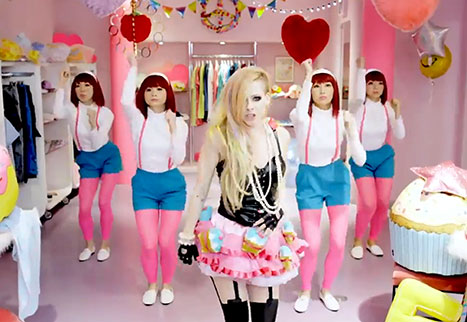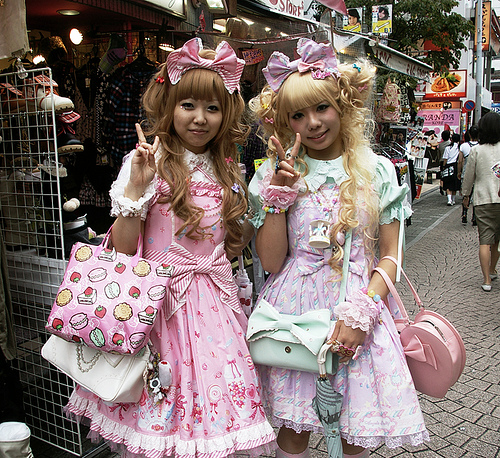
So, this happened.
Earlier this week, Avril Lavigne — a self-professed “tomboy” who at one time encouraged young girls to feel empowered and reject conventional notions of femininity by embracing their counter-culture side — debuted this recent eyebrow-raising travesty: a music video accompanies her song “Hello Kitty”. And, it’s… well… horrific.
(video after the jump)
httpv://www.youtube.com/watch?v=LiaYDPRedWQ
Where to begin?
Let’s start with the easy stuff: the video’s casting of four East Asian women to serve as simultaneous backup dancers and racial props. Gwen Stefani in her Harajuku phase had L.A.M.B.; before her, Madonna had whatever the hell is happening in this video.
httpv://www.youtube.com/watch?v=cAVx9RKaLPU
Since time immemorial, pop divas have been transforming Asian men and women into dehumanized faceless hordes by dressing them in identical clothes and directing them to act stoically for the camera as backdrop for the songstress. In this way, this video, like its many predecessors in American pop music, have been reinforcing ideas of Asians and Asian Americans as indistinct and dehumanized:as props, not people. Lavigne’s poor man reinterpretation of Gwen Stefani’s Harajuku girls are as racist as they are derivative: Asian women are not here to be your fawning pets.
Then, there’s the Orientalism. Lavigne’s video draws upon the large kawaii (meaning literally “cute”) sub-culture within Japan — essentially the target demographic of the Sanrio powerhouse that created the “Hello Kitty” character — and conflates it with notions of shojo (meaning literally “little girl”). Both cultural elements are strongly Japanese, but in Lavigne’s video are recast in an exaggerated larger-than-life manner. Lavigne’s own Orientalism is also evident: from her repeated shouts of Japanese phrases that strung together become meaningless (“Minna saiko, arigato! K-K-Kawaii!” translates to “Thanks for being a great audience! CU-CU-CUTE!”); to her prancing around in a Japanese candy superstore; to her gleeful overexcited clapping at being presented with sushi; to her defensive tweet declaring she loves Japanese culture, Lavigne is clearly obsessed with all the (kawaii) parts of Japan that are distinct from Western culture.
RACIST??? LOLOLOL!!! I love Japanese culture and I spend half of my time in Japan. I flew to Tokyo to shoot this video…
— Avril Lavigne (@AvrilLavigne) April 24, 2014
Which leads me to the bizarre sexism of this video. Kawaii culture, and images of the Japanese shojo, have both been questioned for their disturbing influences on Japanese and worldwide feminism. In shojo, gender stereotypes of women as weak, emotional and preoccupied with romance are exaggerated; in kawaii, women become infantalized to such an extent that it has led to (among other tropes) the popularization of Lolita fashion wherein adult women dress as prepubescent girls of the Victorian age.

Whether it is because of her latent Orientalism or her final desperate gasps before her thirtieth birthday to stay relevant as a tween songstress, perhaps what is most bizarre about “Hello Kitty” is Lavigne’s regression from her throaty tween-feminist(-ish) skater grrrl persona who crooned about self-acceptance, into a high-pitched, squeaking, infantalized bishojo princess who embraces the very icon of corporate marketing while she sings a sexually-suggestive word vomit disaster of a song about O-M-F-G-slumber-parties-kawaii!
What happened, Avril? You’re wearing a puffy pink tutu thing for crying out loud! This isn’t you at all.
You came over unannounced, dressed up like you’re something else. But, where you are ain’t where it’s at. You see, you’re making me laugh out when you strike your pose. Jesus, girl, take off all those silly clothes.
You know you’re not fooling anyone when you’ve become somebody else around everyone else. You’re trying to be cool, but you look like a fool to me.
Tell me, why’d you have to go and make thing so complicated? I see the way you’re acting like you’re somebody else, getting me frustrated. Life’s like this: you fall and you crawl and you break and you take what you get and you turn it into honesty.
Promise me, Avril? Promise me I’ll never again find you fakin’? No. No. No.

